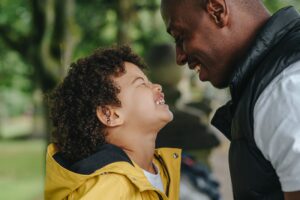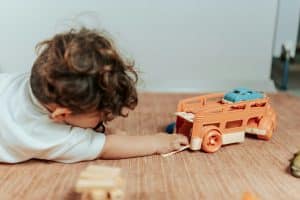Children can experience grief for numerous reasons. They can feel grief over something seemingly small, like a broken toy, or as a result of a significant life event, like a death in the family or moving to a new home or school. Grief is the feeling we have when experiencing a loss.

For young children, all losses can feel monumental, even the ones we see as minor. Helping young children process grief can feel challenging, especially when facing the death of a pet or close family member. The subject of young children and grief might feel uncomfortable, but with a few tips and some practice, we can help our little ones process the big emotions associated with it.
Processing “Little Griefs”
For young children, everyday events can simulate feelings of grief because they have developed the emotional regulation skills to deal with losses and disappointments. These “little griefs,” dropping their ice cream cone on the floor or forgetting their favorite stuffed animal on vacation, are opportunities to teach them coping skills.
Grief is a feeling of loss. If your toddler breaks a favorite toy, they may experience grief and disappointment. It’s tough to see your child sad, but it also lets you teach them essential emotional regulation skills needed when more significant losses occur.
Tips to help young children face “little griefs”
- Validate their feelings. Reassure them that it is ok to feel sad, angry, disappointed, etc.
- Make factual statements: ”
- It really stinks. It’s raining today, and we have to cancel the pool party.
- You were really looking forward to visiting the library today. I’m sorry that you’re sick and we can’t go.
- I know you wanted that. It’s really disappointing that there are none left.
- Make factual statements: ”
- Ask them what they feel in their body.
- This is called interoception and helps children understand how different emotions feel for them.
- If realistic, brainstorm solutions to the problem. For example, a broken toy, a falling block structure, someone else using the toy they wanted, the restaurant being out of chocolate ice cream, etc.
- Create a calming space in your home they can visit when they need a safe space.
- Teach them calming skills like deep breathing and kid-size meditation.
Handling a Big Loss
Hopefully, your child won’t face a significant loss in their early years. However, many kids face the loss of a beloved pet or grandparent. And in some regrettable situations, children are facing the loss of a parent or sibling. You can use many of the above skills to handle minor disappointments with more significant grief. But there are additional tips to help you if you’re facing a challenging and significant loss.
Tips for handling significant losses
- The adult closest to the child should be the one delivering the news.
- Don’t delay telling them the news and avoid public places.
- As soon as it is feasible, sit down with your child and talk with them.
- Let them ask questions, even if you don’t have all the answers, and follow their lead.
- Allow them to express themselves freely, but don’t push or force them to talk.
- Maintain their routine as much as possible. Children need routine and structure to feel safe.
- If you’re dealing with a situation involving a terminally ill parent, don’t hide the illness from your child.
- Keep them updated along the way, and be honest about what is happening.
- Consider enrolling your child in grief counseling, and talk to the school so they know what has happened.
- You should also inform coaches, music teachers, youth group leaders, etc., and anyone who spends significant time with your child.
How Young Children Handle Grief
Young children handle grief differently than older kids, teens, and adults. Toddlers and preschoolers often don’t understand the permanence of death or other permanent changes, like moving to a new city or divorce. Young children may frequently ask when the person who has died is coming back or when they can go back to their home. They may also be perfectly happy and playing one moment and mad or sad the next.
You may also notice changes in your toddler’s or preschooler’s behavior or routines, such as:
- A change in sleep patterns
- A change or regression in bathroom patterns
- A regression in behavior or the way they speak
- Nightmares
- Aggressive behavior
- Anger towards other adults
- Imaginative play where characters have died
In most cases, young children are incredibly resilient and, with proper love and support, will healthily process grief over time. However, in some cases, there are signs that your child may need additional help.
Warning signs include:
- A prolonged depression
- Social withdrawal
- Refusing to go back to school or childcare
- Appetite loss
- A loss of interest in daily activities
- Expressing a desire to go with the person they lost
Create Rituals for Remembrance
A final yet vital step in helping a young child with grief is creating rituals for remembrance. These activities or mementos let children know it is ok to talk about the person they lost and that missing them is a normal feeling.
Ideas for remembrance include:
- Talking about the person who has died regularly as a family member
- Drawing pictures or journaling about them
- Doing something special on the anniversary of their passing
- Celebrating their birthday each year
- Making a scrapbook of memories
- Listening to music or doing activities that remind you of them
- Placing photos of them in a prominent part of the house
- Creating a quilt or pillow with their old sweatshirts or shirts
No matter what situation your child is facing or who they’ve lost, grief is a tremendous emotion for children to process. They often don’t understand it, which makes it all the more confusing. With your help, though, children, even toddlers, can work through their grief healthily.
By L. Elizabeth Forry, June 6, 2024












